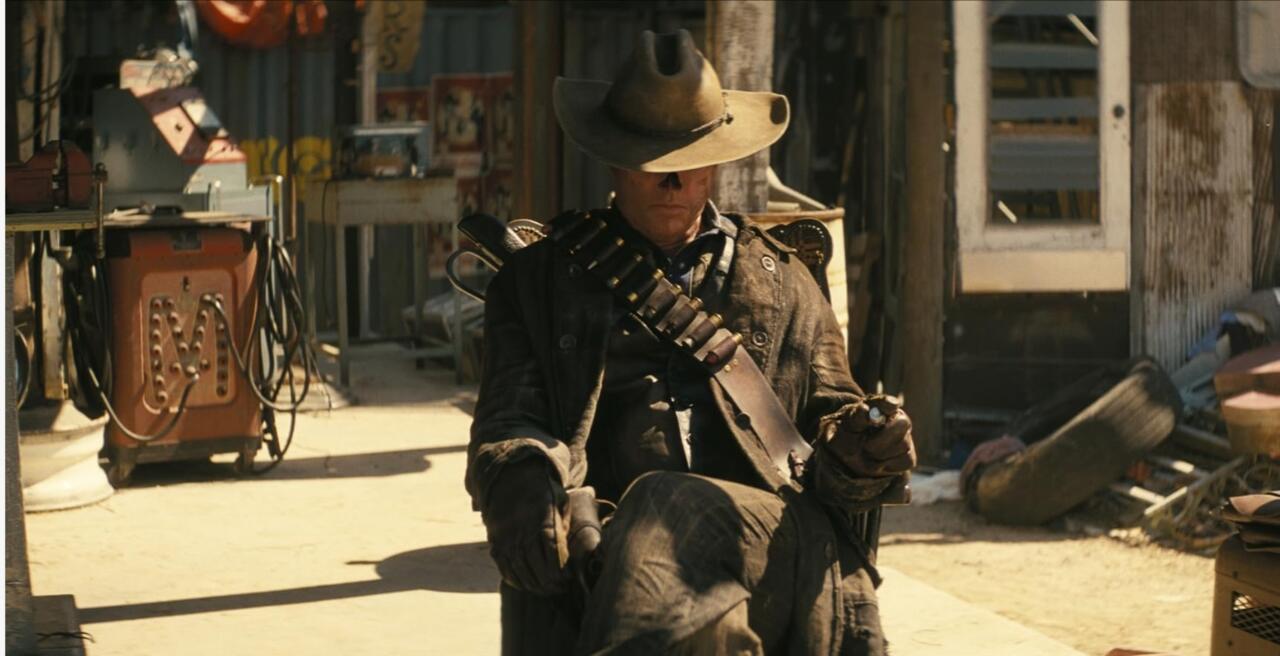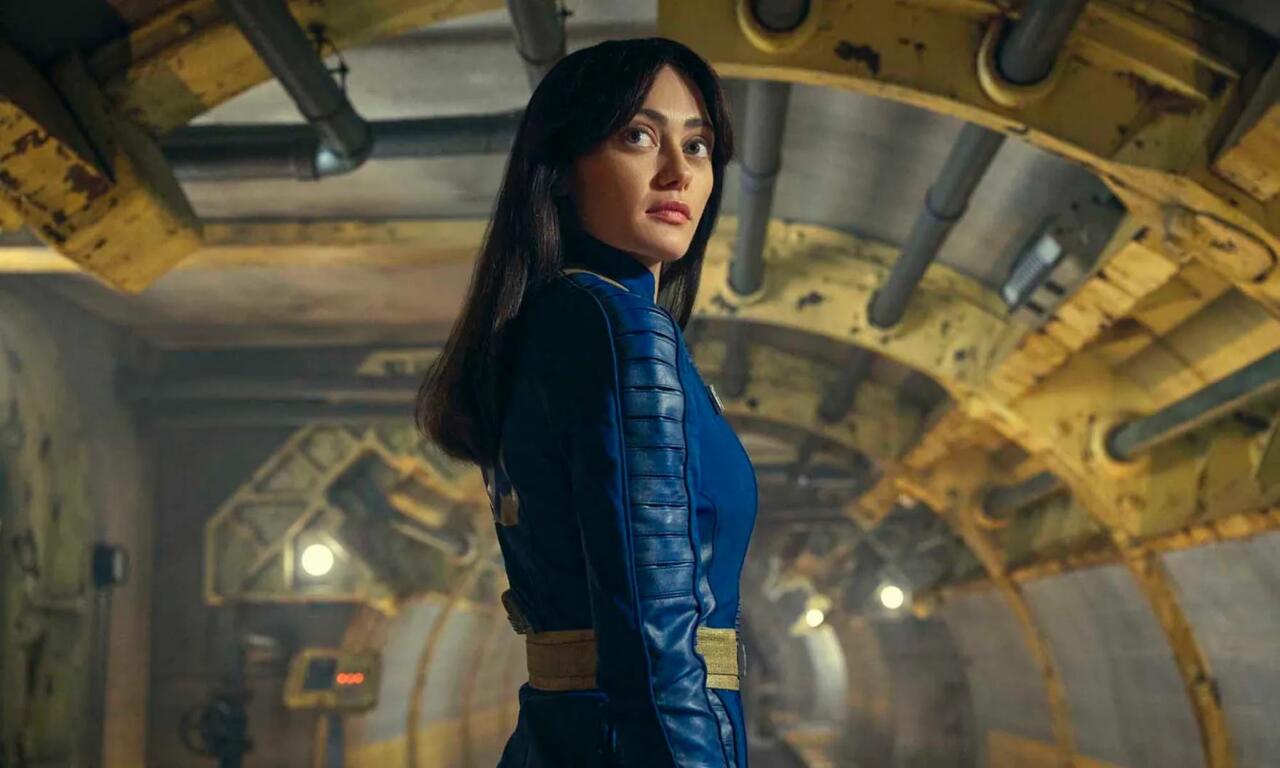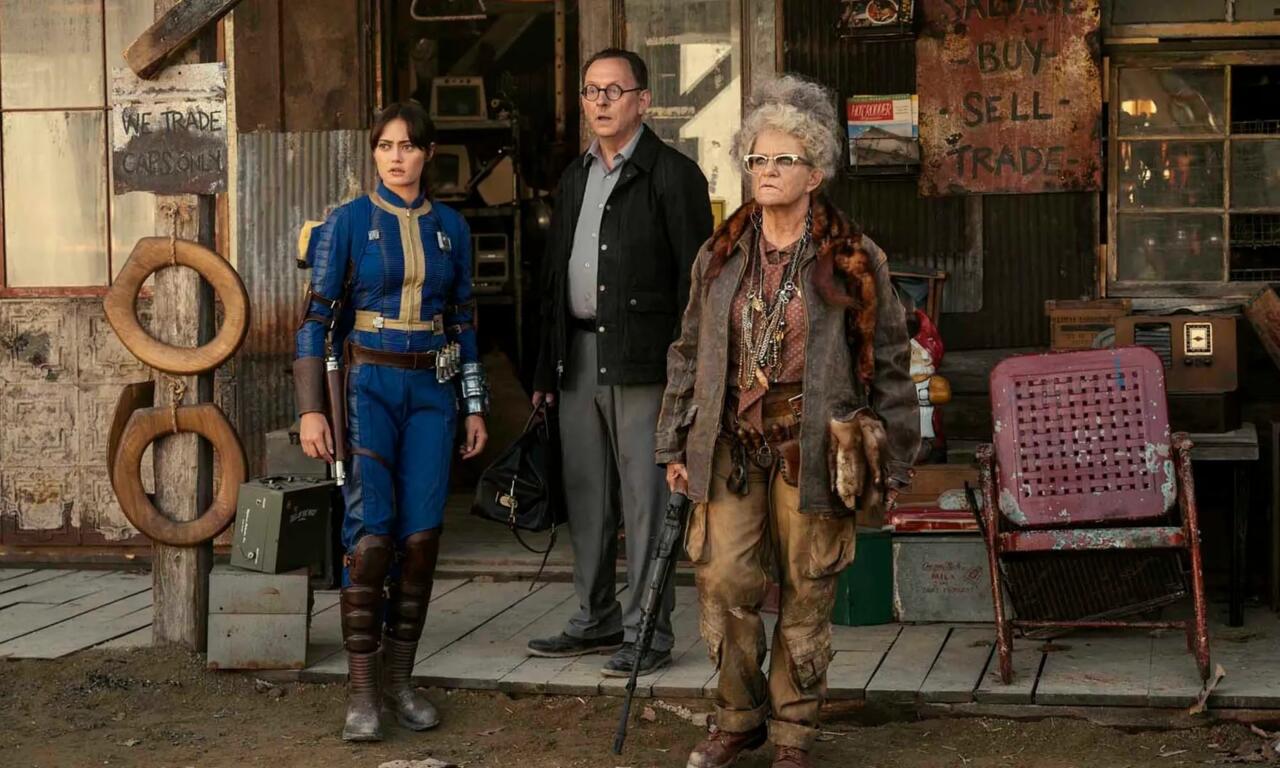Capturing what makes the Fallout series endearing as a TV show is a tall order. So much of the experience relies on the sense of discovery that comes from wandering the Wasteland. You may enter a subway tunnel on a whim and encounter a city made up of people who think they're vampires, or meet a guy who is also a tree. Whether it's speaking with the leaders of factions about their values and deciding whether they're your values, or just sneaking around a supermarket overtaken by murderous robots, Fallout is often about the strange and fascinating stories you stumble on along the way to whatever it is you're supposed to be doing.
And in that, Amazon's eight-episode streaming adaptation of Fallout, from Westworld creators Lisa Joy and Jonathan Nolan, falls short. The show is at its best when it sticks close to its protagonists, who are all separately journeying through the Wasteland. But a huge part of the story is made up of narrative diversions, and these rarely get much attention. While the stories of the large cast of major characters and their experiences are compelling, the pit stops themselves are often a little flat.
Fallout maintains all the familiar conventions of its video game counterparts, and there are a lot of elements of that formula that serve it well. After a brief stint in a 1950s-inspired retro-future Los Angeles, we see atomic bombs annihilate the city and, by implication, the rest of the world. More than 200 years later, the story picks up underground in one of Fallout's familiar shelter societies, Vault 33, where extremely polite people live idyllic--if boring--lives as they await the day when diminished background radiation will allow them to return to the surface.

Where the games usually follow the adventures of one of these Vault Dwellers, the show smartly flips its focus between three different main characters: Lucy MacLean (Ella Purnell, Yellowjackets), the daughter of Vault 33's leader who soon finds reason to leave its safety; Maximus (Aaron Moten, Emancipation), a young acolyte of the technology-obsessed, militant, and vaguely religious Brotherhood of Steel; and The Ghoul (Walton Goggins, The Righteous Gemstones), an irradiated bounty hunter with a zombie-like face.
All three characters intersect at various times as they all pursue a similar goal from different angles, and swapping between their perspectives and experiences with the Wasteland is the engine that keeps Fallout moving. Purnell's Lucy politely asks people for their compliance as she levels a gun at them, and repeatedly finds herself dragged into bad situations by her strong sense of moral duty. Maximus is defined mostly by ambition and the desire to belong as an orphan saved by the Brotherhood, but more than anything, he wants to see himself as a hero. And then there's The Ghoul, a nigh-unkillable gunslinger who marauds around like a funnier version of No Country For Old Men's Anton Chigurh. He's the kind of guy whose mere presence almost always portends certain death for everyone else in the room, and they always know it.
Goggins is often the glue that keeps Fallout together. The Ghoul channels a scarier, semi-psychopathic take on a character like the smooth-talking Uncle Baby Billy of The Righteous Gemstones, and is constantly a pitch-perfect addition of semi-goofy chaos and showmanship. The show juxtaposes The Ghoul's Wasteland murderer present with his past--he was alive before the bombs fell 200 years earlier, when he played a do-right Western lawman in the movies. That allows the show to demonstrate how far both the world and the man have fallen. The Ghoul's ability to show empathy one moment and a murderous glee the next hits exactly the right tone for the world and the show, and he's always compelling to watch.

Purnell and Moten are strong as well, serving as something like mirror images of one another. Lucy's experience coming to terms with the harsh realities of the Wasteland force her to consider compromising her values or deal with the unforeseen consequences of her actions, and Purnell captures the character's wide-eyed, sheltered mix of capability and cluelessness perfectly. Moten's Maximus, on the other hand, is enigmatic and pragmatic--simultaneously a little bit terrible at this whole end-of-the-world survival thing but surprisingly adaptive, both physically and ethically. Both characters bring a nuance to their more heroic archetypes that makes it fun to watch them explore and learn to deal with a world that often wants to kill them. Fallout also regularly jumps back to Vault 33 to follow its funny, sheltered inhabitants while Lucy's brother, Norm (Moisas Arias, Ender's Game), starts to learn things about his world that the powers that be want to keep secret.
The main trouble, though, is that the world around the main characters is often a lot less interesting, largely because it feels like Fallout isn't really willing to linger on any given place or give it much depth, apart from one notable exception. Lucy makes her way to the surface survivor town of Filly early on, and as these places often are in the games, it's ingeniously constructed from various piles of junk; a bus serves as a tunnel between structures, the tail of a plane has been repurposed into a business sign and a chunk of a room, and so on. The place, like most of Fallout's sets and locations, has excellent design and a ton of character, which is highlighted even more when Lucy heads into a shop owned by an old survivor named June (Dale Dickey, Breaking Bad), who hilariously and mercilessly dunks on her for being a doofus Vault-Dweller.
But before long, the whole place becomes nothing more than the backdrop for a gunfight. The action scene itself is a fun one, full of the head-popping, legitimately surprising gore that marks battles in the games, but it makes Filly feel more like a set than a place with a people and a history--something the Fallout games are all about.

The Ghoul notes how the Golden Rule of the Wasteland is that one will always be "sidetracked by bullshit," and the story constantly takes everyone on unexpected tangents away from their goals, to do things like find medicine to treat wounds or track down vital information. The show obviously knows those side quests are foundational to the Fallout game experience, but what the show misses is how those diversions make the world feel alive because of how weird, interesting, and developed they are. While all the moments in Fallout provide important and enthralling character development for its protagonists and several other interesting major characters, the events and places themselves are a bit thin and unmemorable. They are fun asides, but tend to leave me wishing we could hurry up and get back to the main plot--the exact opposite effect of these same moments in the games.
The main plot, for its part, picks up some steam as the show goes on, although it also attempts to do a lot to weave things into a greater mystery than Fallout, as a world, really requires. Criticisms of Westworld often center on how convoluted that show became, especially as it tried to dodge the theorycrafting of viewers, and felt like it traded meaningful stories for unexpected twists. Fallout's mysteries are decidedly less twisty, in a good way; there's a larger picture being drawn as things go on, but it mostly doesn't overwhelm a focus that stays squarely on how these elements affect the characters. But by the end of the season, the point is no longer about venturing through a post-apocalypse or the drama that represents, and we're squared up on a larger plot of villains and conspiracies that makes the whole world feel a little smaller and more manufactured.
The show also sometimes drastically oscillates between absurd and tragic tones, such that it becomes tough to know how to feel about some impactful moments. Fallout is an inherently funny world, a satirical send-up of 1950s culture and capitalism punctuated by Wasteland raiders' heads exploding or British robots cheerfully attempting to remove your organs. Often the show captures that feel and there are a lot of legitimately hilarious moments. Goggins has a ton of great lines that are just slightly goofier than they are badass, Purnell's entire deal is consistently funny, and Moten makes his way through a few scenes with exactly the right look of "uh, whoops" on his face.

But the show also has dramatic, emotional moments, and it's often good at getting the audience to care about its characters enough that the over-the-top violence becomes less funny and more legitimately harrowing. There are a couple of slow-motion fight scenes over Johnny Cash songs or various other '50s oldies, indicating that these moments should maybe be viewed as more absurd than our interest in the characters make them feel. It's not that every joke feels off, but there are times when the experience swings so far one way or the other that it seems unable to settle on what kind of show it wants to be, and so just mashes it all together.
Still, over eight episodes, I often had a good time with Fallout, particularly because its primary characters and their experiences are so engrossing. The show makes a lot of hay from the weird and goofy setting of the game series, and does a great job of filling it with fun, fascinating people. Though it feels like the show could have leveraged its setting even more, seeing how characters cope with life in a world that is both murderous and ridiculous keeps Fallout entertaining, even through its shortcomings.